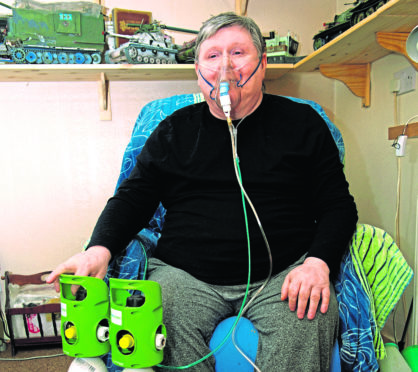NHS Highland has the longest chronic pain waiting times in Scotland – with two patients enduring a wait of more than 72 weeks before treatment.
The latest figures provided to The Press and Journal show a total of eight patients have waited longer than 55 weeks for treatment.
Only one other patient in the whole of Scotland to fall within that time bracket comes from the NHS Grampian area.
But the statistics also reveal only two across the country have waited longer than 72 weeks – and they both fall under the care of the Highland health authority.
The NHS target for treatment of chronic pain is 18 weeks.
>> Keep up to date with the latest news with The P&J newsletter
Even in the busy NHS Greater Glasgow area, a mere 48 patients were not seen within the target time and the longest they had to wait was 36 weeks.
North MSP Edward Mountain said the latest figures have “revealed the full extent” of Scotland’s chronic pain waiting times “crisis” and the “failure” of NHS Highland to meet their 18-week target.
He said: “NHS Highland keeping those in chronic pain waiting for more than 55 weeks for treatment just isn’t good enough.
“Those people suffering chronic pain deserve help and the chair of NHS Highland needs to explain why the health board cannot provide it.”
Highlands and Islands regional MSP and shadow health minister David Stewart added: “These figures relating to waiting times for chronic pain in NHS Highland are frankly not acceptable.
“One fifth of patients waiting are having to wait more than 18 weeks.

“To be the only Health Board in Scotland where patients are waiting more than 72 weeks is shocking and I would assume that there must be some reason.
“I have written to NHS Highland seeking an explanation with regards to these stark waiting time figures.”
NHS Highland treated 225 patients within the 18 week target. A total of 28 waited between 18-36 weeks, 20 between 37-54, six between 55-72, and two over 72 weeks.
NHS Grampian managed to treat 418 chronic pain patients within the 18 week target, 370 between 18-36, 111 between 37-54, and one over 55 weeks.
Throughout Scotland, a total of 3,806 patients were seen within the 18 week target, 536 between 18-36 weeks, 138 between 37-54 weeks, seven (of which six are from Highland) between 55-72 weeks, and two (both Highland ) more than 72 weeks.
The figures are the latest available and are up to the end of June.
An NHS Highland spokesman said: “We acknowledge that there were some pressures on the service in June, but we have done a lot of work since then and have managed to significantly reduce waiting times.
“We are confident that in NHS Highland there are no patients now waiting more than 36 weeks for a first appointment.”
A Scottish Government spokesperson said: “It is not acceptable for people to have to wait such a long time for treatment.
“In October we launched our Waiting Times Improvement Plan, backed with more than £850 million of funding. We expect boards to treat patients waiting the longest wherever possible to ensure waiting times across all specialities are reduced, including waits for chronic pain.
“A Chronic Pain Speciality Group – made up of clinicians, staff and patients – was brought together so that services could be redesigned in order to quickly decide what care is required to best benefit the patient.”
Imagine relying on oxygen cylinders 24 hours a day
That’s the reality for chronic pain sufferer Ally Cargill who waited almost a year for an appointment – and was then told it was cancelled just hours beforehand.
The 64-year-old who lives near Elgin, relies on oxygen cylinders 24 hours a day to survive due to a condition that has caused his lungs to harden.
His wife Pat yesterday expressed “no surprise” at the revelation that waiting times in Grampian and Highlands were the worst in Scotland.
And she said that once Mr Cargill had eventually been seen – after his case was highlighted in the Press and Journal earlier this year – he was given “really good advice about pain relief that has been really helpful”.
However, she added: “If he had been given that advice at the very start then his life would be much more manageable, but he had to wait a year for an appointment, which is terrible”
Mr Cargill’s diagnosis with diffuse pleural thickening asbestosis causes him to feel as if he is constantly breathing with cling film wrapped around his chest.
He regularly needs morphine injections to cope with the pain of the relentless stress.
He had been waiting for an appointment at a pain clinic to speak to specialists about a new way of coping with the agony after being referred by his GP.
The health authority stressed it prioritises patients to ensure those with urgent needs are seen ahead of those who need routine care.
